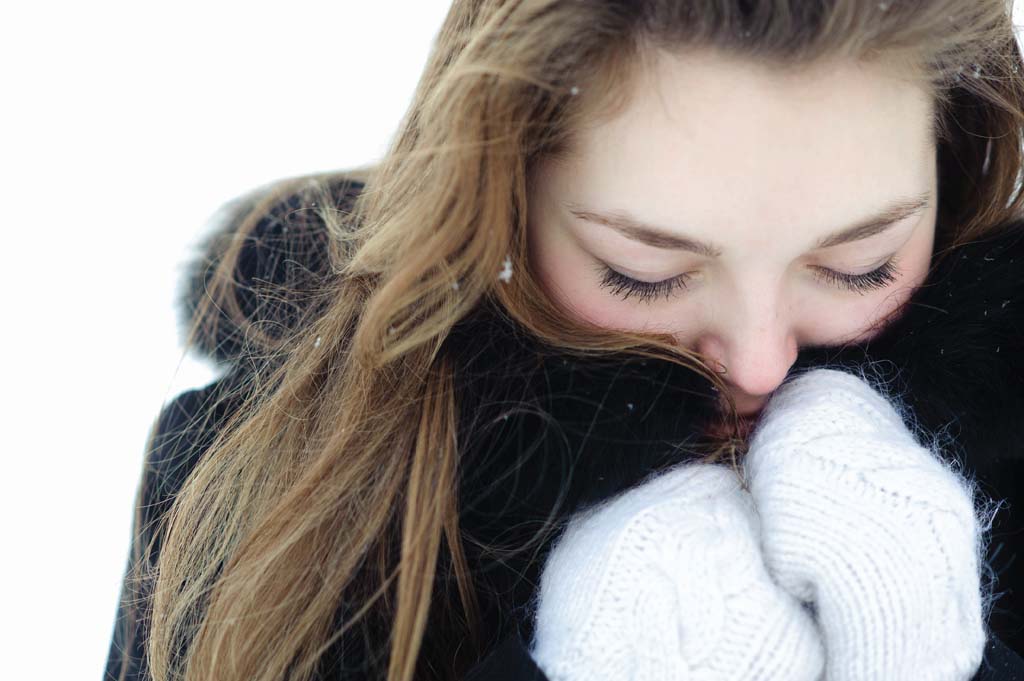Your skin does not like winter.
Biting winds and frigid air, combined with heated indoor air, can suck the life out of dry winter skin.
Living in a subarctic, high-altitude environment like Sun Valley—at 5,945 feet above sea level—means the lower humidity dries out your skin. Combine that with extreme temperature swings in short periods of time (ski slopes straight to toasty après – yes please!) and less oxygen in the atmosphere, and you’ve got a recipe for skin damage.
NOTE: If you don’t live at altitude or in a cold climate, your skin will dry out more dramatically going from a humid environment to the dry mountain air, so you’ll definitely need a game plan to tackle cold-weather woes. No one wants to come back from a ski weekend with a goggle tan and a flaky nose.
“We are so lucky to live in such a great place: unfortunately, the climate is not especially friendly to our skin,” says Callie Jones, esthetician at Pure SV. “It’s important to stay hydrated and use products that help to hold moisture in your skin.”
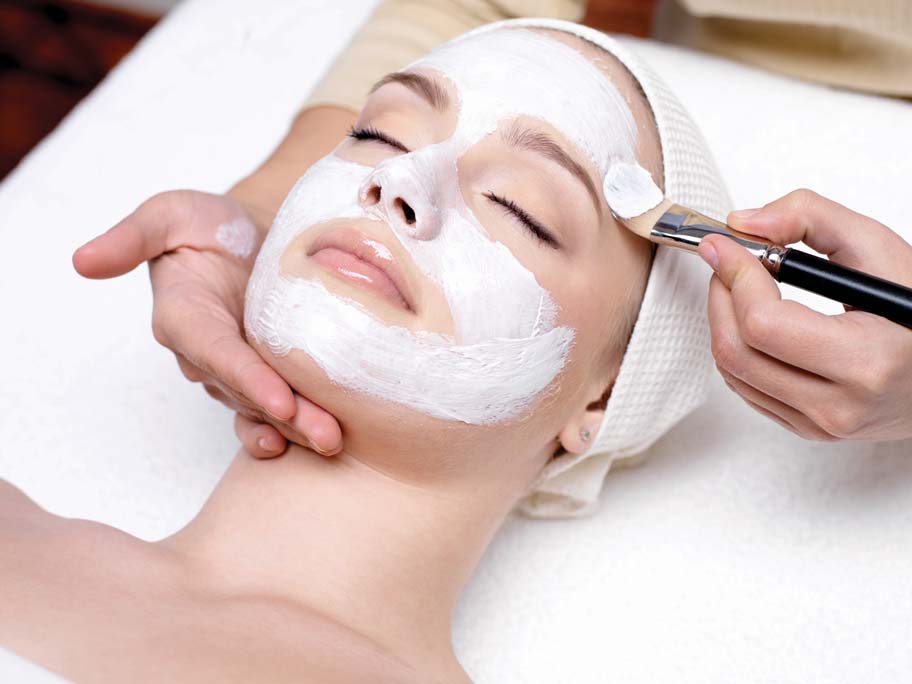
Most estheticians recommend you invest in top-quality, medical-grade skin care for maximum effectiveness (see the sidebar for some great products from local spas). In general, the thicker and greasier a moisturizer, the more effective it will be. Surprisingly, one of the most effective (and least expensive) is petroleum jelly. “Slugging,” as the Internet calls is, involves coating your skin in a layer of Vaseline after moisturizing before going to sleep. You’ll wake up with a more nourished complexion. Yup, that’s right — Vaseline is actually good for your face. It helps your skin seal in all the moisture from the serum and creams you topped it with and lock in hydration.
“The best advice I can give for those suffering from dry skin is to exfoliate,” says Chandler Moore, owner of Simply Skin. “Skin peels or microdermabrasion are a great way to aid in your skin’s cellular turnover—something that happens every 28 to 40 days. When our cellular turnover slows, dead skin cells can build up on the skin, making it difficult for skin care products to absorb. This causes the skin to lack luster and moisture and lead to an overall unhealthy appearance.”
“Some people feel the need to change their skin care routine during the winter,” says Jones. “I always caution my clients to make sure they try and keep their skin balanced; that might mean exfoliating a little more or a little less depending on how dry their skin is feeling. I definitely would discourage taking extra hot showers as too much steam can dry and irritate the skin.”
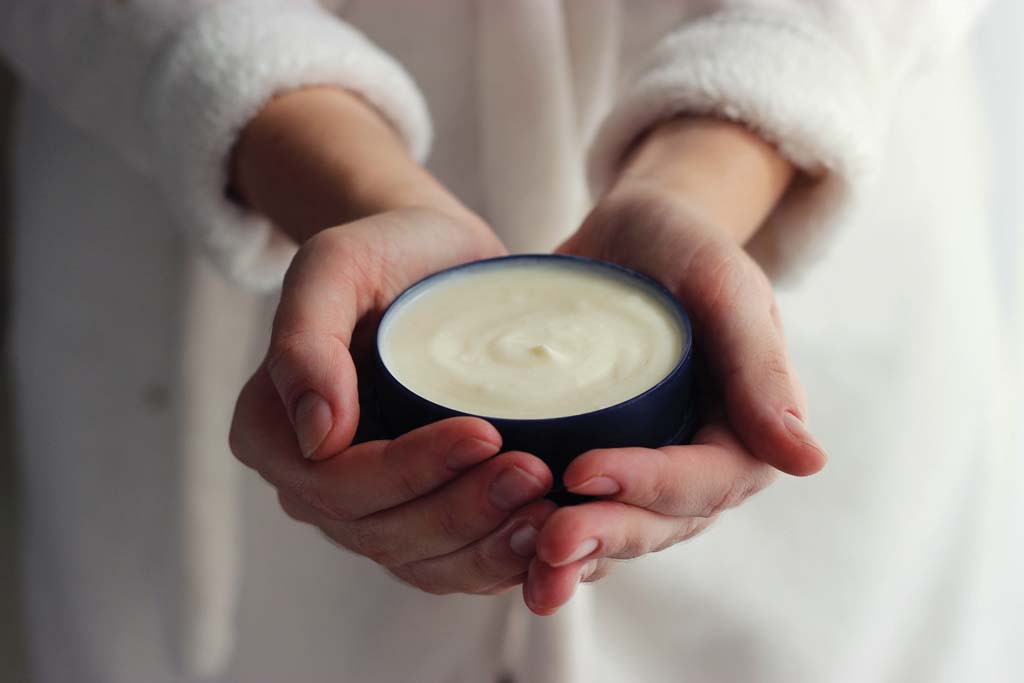
On a cold blustery day, sometimes a hot shower is the only remedy for tingling toes but try to limit yourself to one quick (five to 10 minutes, tops!) bath or shower daily. If you bathe more than that, you may strip away much of the skin’s oily layer and cause it to lose moisture. Use lukewarm water rather than hot water, which can wash away natural oils. Minimize your use of soaps and alcohol products, and instead choose moisturizing preparations such as Dove or Olay or consider soap-free cleansers like Cetaphil. Apply moisturizer immediately after bathing. This helps fill the spaces between your skin cells and seal in moisture while your skin is still damp.
The human body is 60 percent water, so ensuring proper hydration is one of the key things you can do to combat dry skin in the winter months. When you’re touring or skiing, you are losing lots of fluid by sweating during exercise. “Many think that, without the sweltering hot sun, it’s hard to get dehydrated,” says Ryland Mauck-Duff, founder of Elevated Hydration. “Well, it’s actually very common to get dehydrated during the winter months. This is due largely to the blunted thirst many people experience in colder temperatures. Without thirst, we often forget to drink water, which leads to dehydration.”
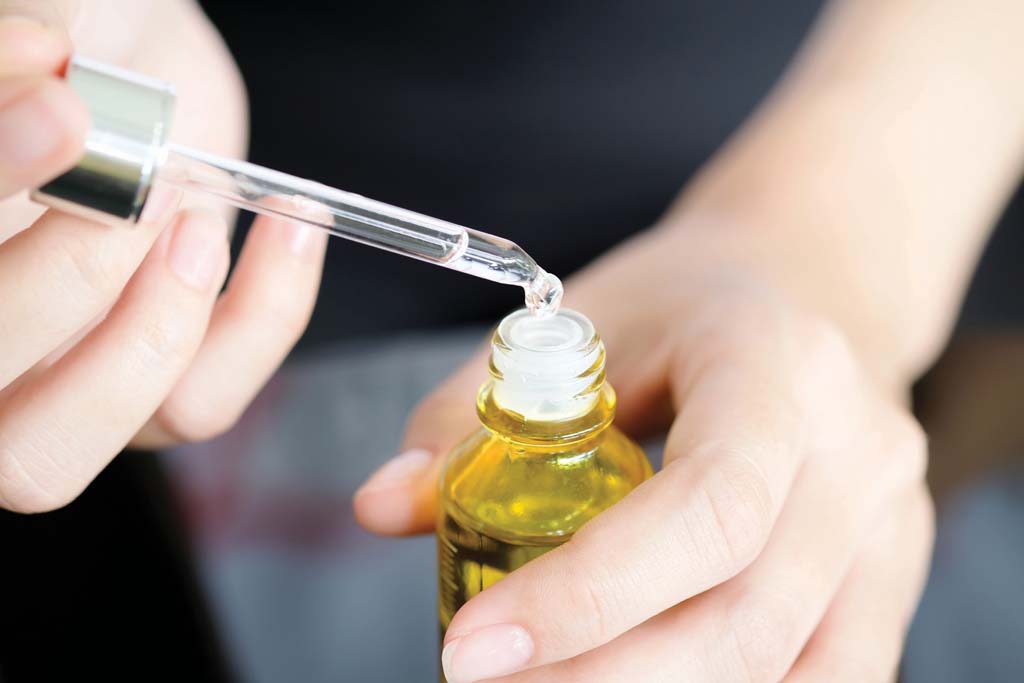
There are a few tricks to keeping up on your hydration during the winter. “Set water drinking goals. Have realistic goals while keeping in mind your body’s hydration needs, which can vary depending on activity level,” says Mauck-Duff. “An individual should drink approximately their body weight in ounces every day. In the colder months, drinking room-temperature water can help prevent the dreaded brain freeze. Also, watch consumption of diuretic-containing drinks such as heavily caffeinated beverages and alcohol.”
“At Elevated Hydration, we have two IV drips that can help individuals stay hydrated and combat dry skin. We offer our Rehydrate drip, a liter of fluid with sodium, to help individuals reset their hydration status. Our Ageless drip, also in a liter of fluid, has vitamin C, B vitamins and glutathione, all of which can help skin health. Optimizing hydration with IV therapy is a great way to give your body a boost in the fight against pesky dry skin.”
Mauck-Duff also recommends supplementing electrolytes to help prevent dehydration and optimize your hydration, especially during exercise.
Electrolyte-enhanced waters have become all the rage lately, and with good reason: they take your simple H20 and give it a boost. A leader in this category is NanoHydr8, developed by athletes, Olympic coaches, and scientists in Salt Lake City. NanoHydr8 uses nanotechnology to break down essential amino acids, vitamins, and nutrients, up to 600 times smaller than competitors. These nutrients are then capable of being absorbed into your body in one to two minutes, significantly faster than the electrolyte packets that dissolve in water. “Not only is the absorption much faster, but it absorbs into every cell, compared to partial absorption from traditional electrolyte drinks,” says Adam Legas, one of NanoHydr8’s founders. Fans of NanoHydr8 swear by the product’s ability to keep them not just hydrated but performing at the top of their games. (And some say it’s a great cure for a hangover!)
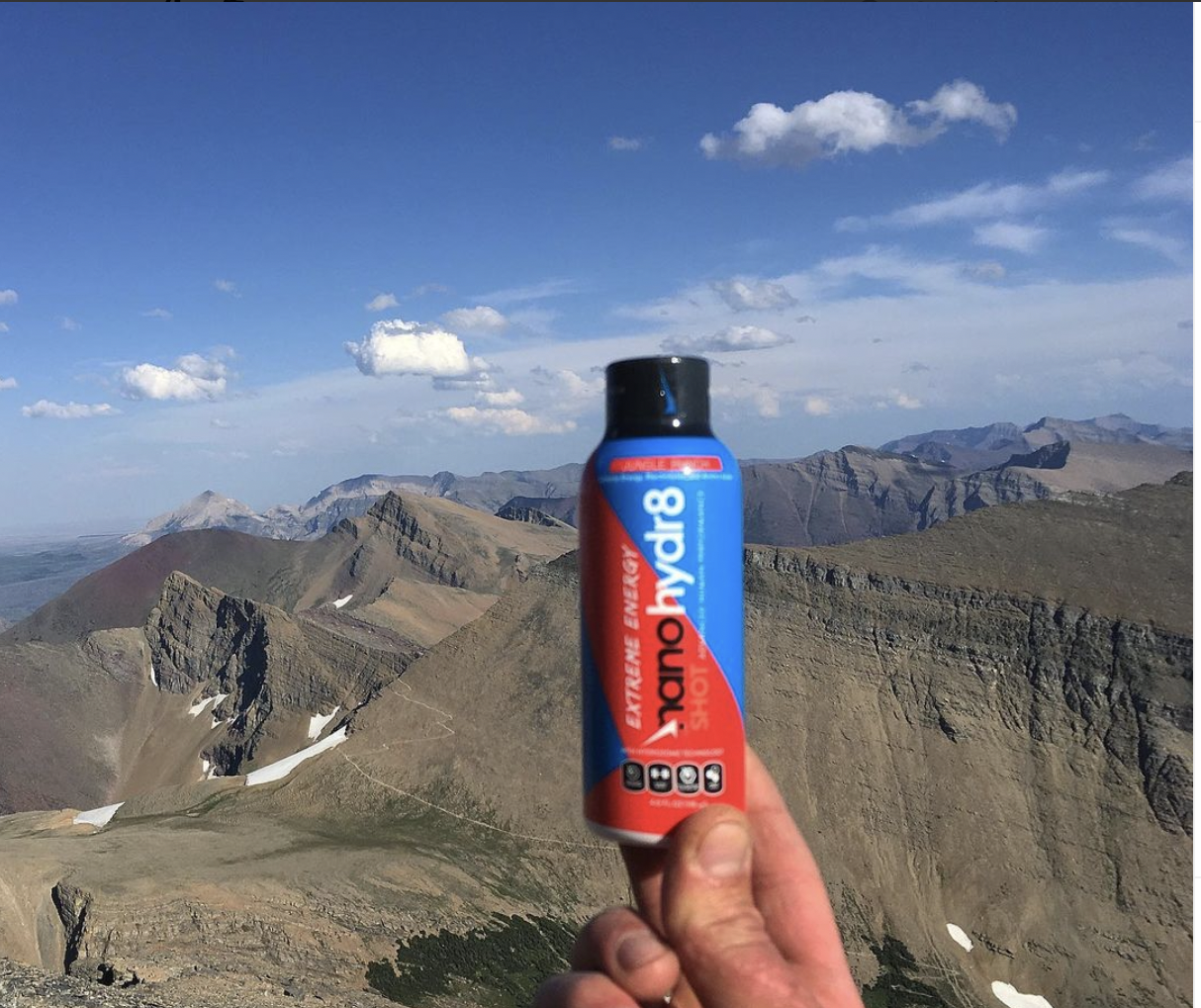
If you are on a mountain that is 9,000 feet above sea level, like Bald Mountain, you are getting 35 percent more sun than at sea level. This means the consistent use of sunscreen is paramount to prevent photoaging. The white snow also acts as a mirror, so you’re not only getting ultraviolet rays that come from the sky – you’re getting extra exposure when those rays reflect back up from the ground. Reach for a sunscreen with a sun protection factor of at least 30 and reapply often, especially when using sunscreen with a natural sun protection agent, such as zinc oxide. Never go out without your lip balm (SPF 15). Lips don’t have oil glands, and they can dry out easily, causing chapped lips. When ski touring, for example, try not to lick your lips, and protect them as most as possible behind a scarf or buff.
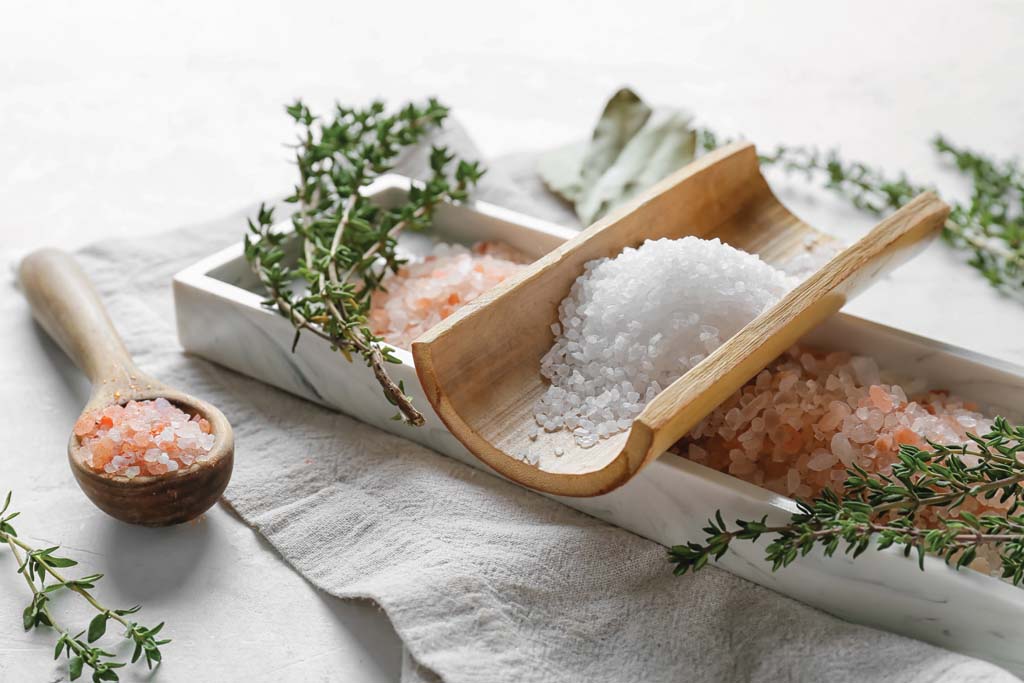
Finally, every self-respecting mountain home has at least one humidifier (if not one per room). Get yourself one and keep it set to around 60 percent, a level that should be sufficient to replenish the top layer of the epidermis. Also, keep your house between 68- and 75-degrees Fahrenheit. Any hotter, and you’ll unravel the benefits you gained from following the advice in this article.
SUN VALLEY SKIN CARE 101
We asked some local experts for their top product picks to help you combat winter weather.
EXFOLIATE
“Our high-mountain desert climate is extremely challenging. Exfoliating is a wonderful way to expose fresher, brighter, and softer skin. With the correct products, exfoliating can be done daily. Our African Black Soap gently exfoliates and is a very effective daily facial cleanser. Our ABS powder comes from Ghana and is made by cooking down a mixture of water and the ashes of plantain skins, palm leaves, and/or cocoa pods. Our Himalayan Salt Scrubs have a heavier grit and are appropriate for the rest of the body. We offer scrubs made with Pink Himalayan Salt, Jojoba oil, and organic Essential Oils. You can choose from nine different aromatherapy blends. For a facial moisturizer, we offer Silky Smooth, a moisturizer made with silk peptides, silk amino acids, aloe vera, and organic rose oil.”
-Alison Rosen, owner of Sun Valley Remedies
FACIALS
“A good home care routine is half the battle when it comes to taking care of your skin. I love Chantecaille’s Hibiscus Smoothing Mask to exfoliate, followed by their Bio Lifting Mask to nourish and lift. My all-time favorite product is Vintner’s Daughter Active Botanical Serum. At Pure, we offer the Hydrafacial, which is a hydrating, non-irritating treatment that is designed for all skin types. It leaves your skin feeling soft, supple, and very moisturized.”
-Callie Jones, esthetician at Pure SV
SERUMS
“If struggling with lack of moisture, find a great antioxidant or vitamin C serum, like Skin Better Science’s Alto Defense Serum. This will protect your skin from free radical damage such as environmental stressors, blue light, and pollution. Next, choose a good retinoid. Retinoids are key to helping the skin slough off those dead skin cells and help to create new ones. But choose wisely as some retinoids can cause more dryness. Skin Better Science’s AlphaRet Overnight Cream has the benefits of a strong retinoid but restores moisture simultaneously. And finally, choose a moisturizer best suited to your skin type. Skin Better Science’s Trio Rebalancing Moisture Treatment is a great option for both men and women. It provides heavy hydration without the weight, while improving the look of fine lines and wrinkles.”
– Chandler Moore, owner of Simply Skin


